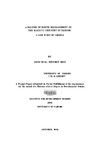| dc.description.abstract | Transport plays an important role in integrating the various sectors in the Kenyan
economy just like elsewhere in the world. It is estimated that the matatu industry in
Kenya controls over 80 per cent of passenger transportation. In spite of this important
role, this study shows that the industry is poorly coordinated, with functions relevant for
efficient operations located across different government departments and agencies.
Further, the industry is characterized by a number of stakeholders with conflicting
interests.
The growth of the industry has not been effectively facilitated by the government. The
government under the Ministry of Transport (MoT) is charged with responsibility of
provision of services, policy guidelines, coordination and law enforcement relevant for
effective management of the operations of transport service. However, due to disjointed
nature of the government institutions and departments the industry is marred with illegal
groups who extort money from the public to make a living.
This study was conducted with an aim of shedding light on institutions, which manage
matatu routes in Nairobi, with a major focus on cartels. The study provides information
on cartels who are thought to be involved in unlawful activities creating fear in the
general public, and operating in the midst of government institutions and departments.
Areas investigated include: ^lae origin, existence and involvement of cartels in the
management of matatu industry.
Dandora was chosen as a study site, in particular route number 36. Located in the eastern
part of Nairobi, Dandora estate is one of the many suburbs, which is highly populated.
Majority of the residents are low income earners, very insecure with high crime and
unemployment rates. These attributes partly contribute to the area housing some of the
most dangerous illegal groups, including cartels who manage the matatu routes
The study findings indicate that the cartels came into the industry as a result of the
unregulated vacuum created by the absence of government institutions and departments
at the route level. The study reveals that the cartels are assigning routes to matatu owners even after matatu owners have been assigned routes by the Transport Licensing Board
(TLB), regulating vehicle entry into a route by charging illegal fees, preventing those
who have not paid the fees from operating, preventing others from invading the route;
controlling fares charged to passengers; and collecting daily fees from matatu operators
claiming that it is protection fees. It was evident that colossal sums of money are
collected from the operators, while the services purported to be offered are not rendered.
The study makes a number of recommendations as a step towards finding a lasting
solution to cartels, including the need for government to facilitate formation of a unified
body to run the transport sector. Other recommendations include: harmonising roles and
responsibilities of various government departments and agencies in order to effectively
manage and regulate the industry and facilitating the civil associations to work together;
facilitating the formation of various groups operating within the matatu industry into
Savings and Credit Cooperatives (SACCOS) with organized rules and regulations and
laid down penalties for offenders. This has potential of reducing and eventually
eliminating cartels in the management of matatu routes. | |

